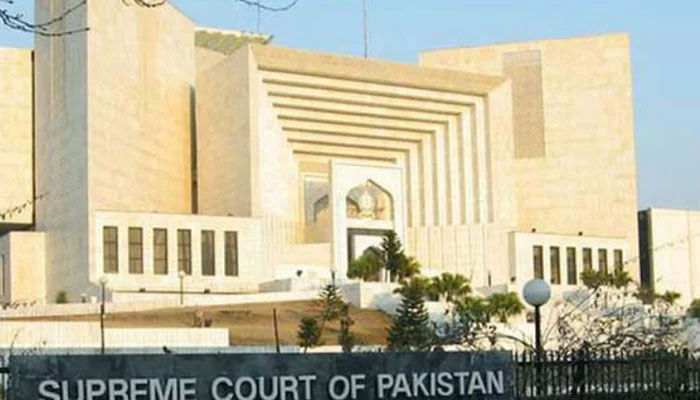No unlawful extradition will be allowed: SC
ISLAMABAD: The Supreme Court Monday directed the federal government to submit a comprehensive report on whether Pakistan had signed extradition treaties with the United States (US) and the United Kingdom (UK).
At three-member bench of the apex court, headed by Justice Mushir Alam, heard the case of a citizen, Talha Haroon, an accused in the New York Times Square attack. The accused had challenged his extradition to the United States.
The court restrained Haroon’s extradition until further orders and summoned the Attorney General for Pakistan and officials of the Ministry of Foreign Affairs. The court sought a comprehensive report stating if extradition treaties had been signed by Pakistan with the United States and the United Kingdom besides furnishing details about how many Pakistanis had been handed over to these countries and details pertaining to Pakistanisextradited from these countries as well.
The court asked Additional Attorney General Sajid Ilyas Bhatti whether extradition treaties had been signed by Pakistan with the UK and the US to which the law officer replied that he would look into it and inform the court.
Justice Qazi Muhammad Amin asked how extradition of prisoners was possible if no agreement had been signed with these two countries. The judge observed that the US got custody of whoever it wanted without agreement and questioned what was the evidence on the basis of which the accused were handed over.
He further asked how a sovereign country like Pakistan could hand its citizen to over another country. “We will protect our citizens but in accordance with the law,” the judge remarked. Tariq Mahmood, counsel for the petitioner, drew the court’s attention to its previous orders for extradition of Hussain Haqqani, Pakistan’s former ambassador to the US which were never implemented in letter and spirit.
He said a single-member bench of Islamabad High Court had ruled in his client’s case that the “evidence is not admissible”. He further submitted that in the intra-court appeal, the IHC had asked the magistrate to first determine the accused's guilt.
The counsel contended that his client feared that the magistrate might carry out an inquiry just for the sake of satisfying the IHC's condition and subsequently issue orders for Haroon’s extradition.
Meanwhile, the court summoned on the next date of hearing, attorney general for Pakistan and officials of the Ministry of Foreign Affairs directing them to bring with them complete record of prisoners extradited from and to Pakistan from the US and the UK and adjourned hearing for two weeks.
-
 Royal Family's Approach To Deal With Andrew Finally Revealed
Royal Family's Approach To Deal With Andrew Finally Revealed -
 Super Bowl Weekend Deals Blow To 'Melania' Documentary's Box Office
Super Bowl Weekend Deals Blow To 'Melania' Documentary's Box Office -
 Meghan Markle Shares Glitzy Clips From Fifteen Percent Pledge Gala
Meghan Markle Shares Glitzy Clips From Fifteen Percent Pledge Gala -
 Melissa Jon Hart Explains Rare Reason Behind Not Revisting Old Roles
Melissa Jon Hart Explains Rare Reason Behind Not Revisting Old Roles -
 Meghan Markle Eyeing On ‘Queen’ As Ultimate Goal
Meghan Markle Eyeing On ‘Queen’ As Ultimate Goal -
 Japan Elects Takaichi As First Woman Prime Minister After Sweeping Vote
Japan Elects Takaichi As First Woman Prime Minister After Sweeping Vote -
 Kate Middleton Insists She Would Never Undermine Queen Camilla
Kate Middleton Insists She Would Never Undermine Queen Camilla -
 King Charles 'terrified' Andrew's Scandal Will End His Reign
King Charles 'terrified' Andrew's Scandal Will End His Reign -
 Winter Olympics 2026: Lindsey Vonn’s Olympic Comeback Ends In Devastating Downhill Crash
Winter Olympics 2026: Lindsey Vonn’s Olympic Comeback Ends In Devastating Downhill Crash -
 Adrien Brody Opens Up About His Football Fandom Amid '2026 Super Bowl'
Adrien Brody Opens Up About His Football Fandom Amid '2026 Super Bowl' -
 Barbra Streisand's Obsession With Cloning Revealed
Barbra Streisand's Obsession With Cloning Revealed -
 What Did Olivia Colman Tell Her Husband About Her Gender?
What Did Olivia Colman Tell Her Husband About Her Gender? -
 'We Were Deceived': Noam Chomsky's Wife Regrets Epstein Association
'We Were Deceived': Noam Chomsky's Wife Regrets Epstein Association -
 Patriots' WAGs Slam Cardi B Amid Plans For Super Bowl Party: She Is 'attention-seeker'
Patriots' WAGs Slam Cardi B Amid Plans For Super Bowl Party: She Is 'attention-seeker' -
 Martha Stewart On Surviving Rigorous Times Amid Upcoming Memoir Release
Martha Stewart On Surviving Rigorous Times Amid Upcoming Memoir Release -
 Prince Harry Seen As Crucial To Monarchy’s Future Amid Andrew, Fergie Scandal
Prince Harry Seen As Crucial To Monarchy’s Future Amid Andrew, Fergie Scandal




